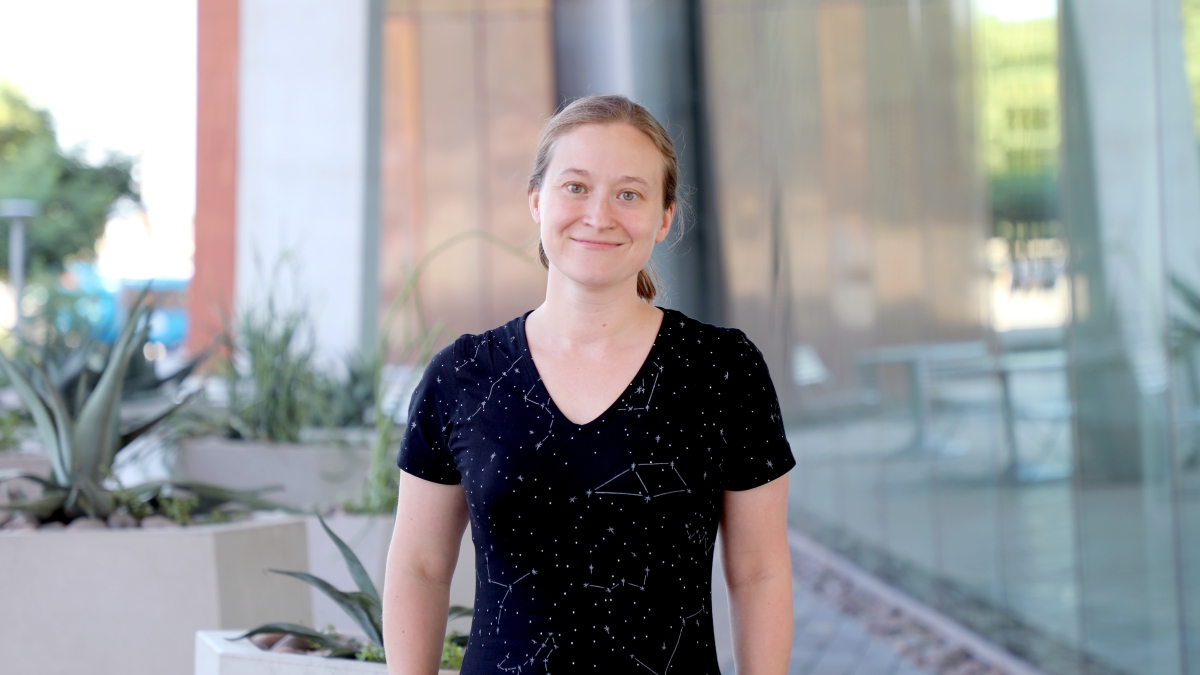ASU evolutionary cell biologist awarded 2021 Sloan Research Fellowship

Kerry Geiler-Samerotte is an evolutionary cell biologist and assistant professor in ASU’s School of Life Sciences and the Biodesign Center for Mechanics of Evolution.
Arizona State University Assistant Professor Kerry Geiler-Samerotte was recently named a recipient of the 2021 Sloan Research Fellowship, one of the most prestigious awards available to early career researchers.
The fellowship is awarded annually by the Alfred P. Sloan Foundation to extraordinary U.S. and Canadian researchers in eight scientific and technical fields: chemistry, computational and evolutionary molecular biology, computer science, Earth system science, economics, mathematics, neuroscience and physics. The grants support original research and recognize distinguished performance, creativity and notable potential for future contributions to these fields.
“Kerry is a wonderful colleague, mentor and educator, making significant contributions to our understanding of how cellular features evolve at the molecular level,” said Michael Lynch, director of the Biodesign Center for Mechanisms of Evolution and professor in the School of Life Sciences. “Competition for Sloan Fellowships is intense, so the award is a strong validation of her growing reputation as a scholar and emerging leader in our field.”
Geiler-Samerotte is an evolutionary cell biologist and assistant professor in ASU’s School of Life Sciences and the Biodesign Center for Mechanisms of Evolution.
As biologists work toward understanding and developing solutions to the world’s health problems, one major challenge is how much the effects of genetic variation depend on context. For example, contexts like environments and genetic background can change whether a mutation has a positive or negative impact on an organism’s health. This can obscure which genetic variants are contributing to disease. It also complicates predictions for how genetic variations present across diverse populations will respond to drugs.
To combat these challenges, Geiler-Samerotte intends to move beyond simply mapping the effects of genetic changes on organisms, to understanding how and why these effects change across diverse contexts.
“I'm motivated by the idea that biologists may need to change the way we think,” she said. “Many ideas are still founded on the notion that genetic changes have fixed, rather than context-dependent, effects.
“For example, consider 'evolutionary traps,' which aim to trap infectious microbes or tumors by selecting for mutations that encourage resistance to some drugs at the expense of others. These traps will fail if cells can escape via contextual changes that disrupt the correlation between resistance and susceptibility. But how common is context dependence? Is it common enough to create concern? These are the questions that my research will answer.”
She combines high-throughput experiments in yeast with cutting-edge statistical and computational approaches to measure the characteristics and strength of a large number of mutations across different environments. She uses these measurements to build predictive models to reveal how new mutations will behave in contexts and environments we haven’t studied before.
“I am honored to receive this award and to have my work be supported by the Sloan Foundation,” she said. “This award will allow me to increase the throughput of my experiments that measure the impacts of mutations across different contexts, which will provide a richer understanding of context dependence.”
The Alfred P. Sloan Foundation was established in 1934, and the first Sloan Research Fellowships were awarded in 1955. Highly sought after, former Sloan Research Fellows have gone on to receive some of the highest honors the scientific and technical communities can bestow, including the Nobel Prize, Fields Medal in mathematics, National Medal of Science and the John Bates Clark medal in economics.
The 2021 fellowship cohort includes 128 researchers from 58 institutions across the U.S. and Canada. Each will receive a two-year, $75,000 fellowship that can be used to advance their research. Geiler-Samerotte joins seven other faculty from ASU who have received a Sloan Research Fellowship over the years.
“ASU is the best place for this research because of the interdisciplinary nature of our research centers and departments,” said Geiler-Samerotte. “My work involves evolutionary, computational, molecular, cell and quantitative biology. I enjoy being part of a research community where scientists from different disciplines work together to improve each other's research and let each other achieve more than would have been possible alone.”
“Dr. Kerry Geiler-Samerotte’s innovative approach toward characterizing the impacts of mutations in multiple conditions utilizes precise, high-throughput methodologies in budding yeast,” said Kara Schmidlin, a senior research specialist in Geiler-Samerotte’s lab. “This work will provide a better understanding of how context-dependence shapes evolution.”
More Science and technology

ASU-led space telescope is ready to fly
The Star Planet Activity Research CubeSat, or SPARCS, a small space telescope that will monitor the flares and sunspot activity…

ASU at the heart of the state's revitalized microelectronics industry
A stronger local economy, more reliable technology, and a future where our computers and devices do the impossible: that’s the…

Breakthrough copper alloy achieves unprecedented high-temperature performance
A team of researchers from Arizona State University, the U.S. Army Research Laboratory, Lehigh University and Louisiana State…

